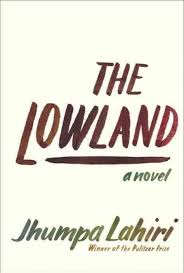The Lowland (2013)

Exploring sibling relationships is often an important dimension of the therapeutic process. Understanding the dynamics between siblings sheds light on one’s historical roles in the family. Understanding family roles from childhood can be key to understanding current patterns in romantic, professional and social relationships.
Jhumpa Lahiri’s riveting new book, “The Lowland”, begins with a beautiful narrative exploring the complex relationship between two brothers growing up in Calcutta. Subhash and Udayan are just 15 months apart and, while they are incredibly close, they are also completely different. Through tracking their stories and the complex ties that bond and challenge them, this heartbreaking novel demonstrates that sometimes the most intense sibling rivalry may take place among the closest of siblings. Lahiri understands that intense competition between siblings is not always conscious, and is not a reflection of how much siblings love one another. Siblings are hard-wired to compete, and parents may, without realizing it, foster their competition.
This gripping and poetic novel explores themes of loneliness, isolation, family secrets, political will, and the power of unconditional love. Lahiri understands that unresolved conflicts from one’s past can cause us to create the kind of life we most want to avoid. Someone who wants to feel connected more than anything may play a tremendous role in their own loneliness and isolation. To this end, unresolved conflicts can lead us to choose unsuitable partners and deeply unsatisfying relationships. By facing painful dimensions from the past and acknowledging family secrets, the life one desires may eventually be possible.
Lahiri also understands that those who go through the most pain before they find love and connection tend to treasure it the most. In a beautiful description of one character’s marriage later in life, Lahiri describes the humbling joy he feels in having found his life partner. Her words explain with directness and clarity that one cannot choose a happy, healthy relationship until one is emotionally ready to experience intimacy:
“He wakes up in the bed where he lies with his new wife…He goes downstairs and pens the door at the back of the house. He steps barefoot onto the wooden porch that overlooks the garden, the pastures beyond, running down the Kenmare Bay. His hair is thick, snowy white. His wife likes to run her fingers through it. He sees the wide beam of the moon’s light over the water, pouring down. He is overwhelmed by the sky’s clarity, the number of stars…He returns to bed, still looking out the window at the sky, the stars. He is startled anew by the fact that their beauty, even in daytime, is there. He is awash with the gratitude of his advancing years, for the timeless splendors of the earth, for the opportunity to behold them…The years the couple have together are a shared conclusion to lives separately built, separately lived. There is no use wondering what might have happened if the man had met her in his forties, or in his twenties. He would not have married her then.”
For those struggling to come to terms with complicated sibling relationships, and for those who tend to choose unsatisfying relationships and unsuitable romantic partners, “The Lowland” is a must-read testament to the human ability to overcome these challenges.
